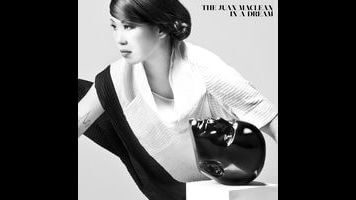It’s no surprise. The band has always been at its best when Whang was given the spotlight, like on “Happy House,” where an entrancing tornado of classic Chicago-house piano, tambourine, and driving bass swirls around her. MacLean might be the first voice we hear on In A Dream, his croak echoing out over the opening track, “A Place Called Space,” but Whang quickly butts in. She completes the tune’s mix of bubbling Giorgio Moroder-approved bass and wailing lead guitar, conjuring the image of a supremely badass Whang racing a crimson convertible back toward Earth along a neon highway. From there, Whang stretches her range as a vocalist further than ever before. She swaggers through the verses of “You Were A Runaway” and plays the temptress on “Running Back To You,” a sexy yacht-rock nod with cascading synths straight out of “I Can’t Go For That (No Can Do).”
MacLean returns for vocal duty only two more times. “Love Stops Here,” a beautiful synthpop track in the New Order vein, is the one place where his mumbling feels right. His voice is filled with a quiet longing that pairs well with the song’s unrelenting waves of warm arpeggios. Its MacLean’s other star turn, “Charlotte,” where his vocals do the most harm. It’s a piece of cocky dance-floor funk that would be right at home on a Sonic The Hedgehog soundtrack, but MacLean’s singing is just too meek to back up its strut. Luckily, Whang returns with a vengeance one track later on “A Simple Design,” the album’s penultimate stunner. It’s her triumphant knockout blow and the final phase of her metamorphosis from LCD Soundsystem keyboardist to modern disco diva.
In A Dream is undoubtedly the most confident and comfortable The Juan MacLean has sounded. It largely avoids the experimentation and long-winded techno traps that past albums sometimes fell into, instead presenting a friendlier collection of focused and undeniable dance tunes. And at the heart of it all is the emergence of Nancy Whang, who, in retrospect, was The Juan MacLean’s heart all along.









































